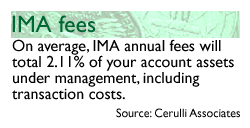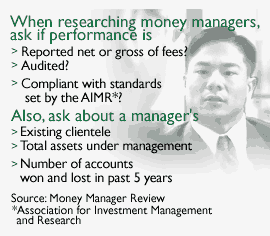|
Is an IMA right for you?
|
 |
May 8, 2000: 12:27 a.m. ET
For the wealthy, a premium investment account free from herd instinct
By Staff Writer Jeanne Sahadi
|
NEW YORK (CNNfn) - As problems go, there's no need to pull out the handkerchief for this one. But if you're flush enough with cash to max out your 401(k) and IRA, own your home, and still have a few hundred thousand investing dollars left to collect dust, you might wonder how best to put your wealth to work.
Mutual funds are certainly popular vehicles. In fact, a good portion of your money may have been built by fund performance in the bull market.
But there's another option: An individually managed account, or IMA, offers investors with a spare $100,000 or more the same caliber of professional money management that a fund does but with more personalized service - greater, say, over the holdings in your account - and a chance to better manage the tax bite of investing.
Get the tax advantage
An IMA is tailored to your specific investment goals, and you own each of the securities, such as stocks and bonds, purchased on your behalf. And unlike in a mutual fund, your money is not pooled with other people's.
This can be an advantage in a number of ways.
 Remember those capital gains distributions you had to report for a fund you'd only been in for two months? "Whenever you buy into a fund, you buy into an embedded capital gain," said certified financial planner (CFP) Eric Kendrick of Austin, Texas. Remember those capital gains distributions you had to report for a fund you'd only been in for two months? "Whenever you buy into a fund, you buy into an embedded capital gain," said certified financial planner (CFP) Eric Kendrick of Austin, Texas.
That means, come tax time, "you get socked with others' gains," said Peter Walker, founder and editor of Money Manager Review.
Secondly, the manager of your IMA, who will be apprised of your tax situation, can sell any one of your securities to offset a capital gain or loss elsewhere in your portfolio.
And, equally important, your IMA holdings won't be subject to the herd instinct. Take a mutual fund that's experiencing a lot of redemptions. The portfolio manager might be forced to sell positions he'd rather not in order to raise cash. That may boost your transaction costs and incur more capital gains distributions.
"People tend to be a lot more emotional (with mutual funds). It's a more volatile situation for the manager," Walker said.
Think long-term; think diversity
Despite the advantage of IMAs, that doesn't mean mutual funds aren't desirable for a good portion of your money, especially in tax-deferred shelters.
"Mutual funds are great vehicles for retirement," said Kate Monaghan, a spokesperson for Malvern, Pa.-based Lockwood, which provides research on money managers to investment advisers.
That's true particularly if you're seeking diversity, she said. If you have less than $400,000 to invest in an IMA, you may need mutual funds to achieve the kind of varied asset allocation that will help you beat the market. IMA minimums are usually $100,000 -- which means the full amount will be invested with one money manager who applies one investment style, such as small-cap growth or large-cap value.
For true diversity in an IMA, you'll need access to at least four different money managers, Monaghan said. But that doesn't mean an IMA of $399,000 or less can't be a good tax-advantaged addition to your overall portfolio.
How to set up an IMA
If you think an IMA is right for you, you should speak with an independent investment adviser or an adviser at a large brokerage house that runs separately managed and wrap account programs.
 Of course, not all advisers may be familiar with IMAs. So if you're in the market for one, you might call places like Lockwood, or check the Web site of Money Manager Review for referrals in your area. Of course, not all advisers may be familiar with IMAs. So if you're in the market for one, you might call places like Lockwood, or check the Web site of Money Manager Review for referrals in your area.
Keep in mind "what you're buying is a money manager," said CFP Hank Hanau of New York. They may come from well-known investment shops, like Janus, or from smaller boutique firms.
Either way, the more information you can collect on his or her track record the better off you'll be. Your adviser should do much of the leg work for you, since services like Lockwood don't work directly with investors but provide their research to the investors' advisers.
But you can also do some research on your own. For a monthly, half-year or annual subscription, you can check MMR's database of information on money managers. It allows you to analyze their performance and assess the risk you assume when you invest with them.
You can also measure a person's performance against the returns of his or her peer managers, as well as against relevant outside benchmarks such as the S&P 500 and the Russell 2000.
Paying the piper
The fees you pay are based on a percentage of your total assets under management. The average IMA annual fee is 2.11 percent, according to investment research firm Cerulli Associates.
That fee is usually broken down in several ways. Lockwood, for instance, assesses a charge for the money manager, clearing and custody of your account, and Lockwood's brokering services. In addition, you will pay a fee to your investment adviser.
So, for $100,000, you will pay 1.25 percent of your account, plus your adviser's fee, which may be a 1.0 percent or more.
As with mutual funds, though, there are break points, so the more you invest, the less you pay. A $1 million account, for example, will knock off a quarter percent from the Lockwood-related charges.
But don't feel limited to those break points. As with most things in life, if you're walking in the door with a few million dollars, you can certainly negotiate a lower fee.
"Money talks, let's face it," said CFP David Dondero of St. Paul, Minn.
When an IMA isn't right for you
Still, no matter how much cash you have, if you are a hands-on, market-timing investor who likes to trade frequently, an IMA may not be your best choice.
The value of a premium service account is the expertise managers apply to your individual investment goals.
"If you're going to a managed account, let the manager do the picking," Dondero said.
Or, think of it this way, Monaghan suggested: "You buy your shirts off the rack until you can get them tailored." 
|
|
|
|
|
|
Money Manager Review
|
Note: Pages will open in a new browser window
External sites are not endorsed by CNNmoney
|
|
|
|
 |

|

